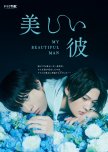
Cette critique peut contenir des spoilers
An intriguing depiction of imperfection, flaws and insecurites
I think everyone is pretty familiar with the saying: Do not judge a book by its cover. I can comfortably say that, in this case, to not judge a show by its premise. Really… just don’t. And I am going to tell you why, though this may turn out a little longer than necessary.To kick things of, I can say that this series receives a very solid 9/10 from me: superb cinematography (esp. Ep. 2, which, by the way, is my favourite episode out of all 6), wonderful acting (esp. Hagiwara Riku as “Hira Kazunari”, though Yagi and Takano were both splendid as well), interesting story (though I would not call it complex), wonderful direction as well as good art design. Season 2? Yes, I’d be most thrilled to go in for another ride.
Is it a masterpiece? Not quite, but it is nonetheless a very good series. But, to call it a masterpiece would, in my eyes, be quite the overstatement. But why?
I found there were two or three “little” weak points. For instance, Ep. 4 is my least favourite. To me, this episode seemed a bit rushed, even cramped. I also am not - in fact never have been - particularly keen on having a time skip taking place in dramas, as often times none of the major characters change anything about their clothing or hair style or adapt a different vocabulary. While Hira may indeed not very much alter his style, I refuse to believe that someone like Kiyoi would not be interested in trying, say, new hair styles.
Koyama’s character, while surely nicely played by Takano Akira, is given very little room in this show and does not really leave a lasting impression on the viewer. This is partially the fault of the series running time. For I found that 6 episodes were not enough to cover their (individual) stories/the first novel sufficiently. As a result, I felt that the series lacks certain moments that would add so much substance to the characters. I would have loved to see more of Kiyoi's background, for instance, or hearing his take on "beauty". I would have wanted to see what influence Hira's parents had on him in his younger years other than having him taking pictures or the effects of his former homeroom teacher as well as Yama-chan (for those who have read the novel know of whom I am talking) and her subsequent behaviour had on him. But, of course, since they were going for 24 min., they had to cut out a lot of scenes.
And thus, in my opinion, the pacing varied greatly from episode to episode.
Ep. 1 & 2 had such a wonderful pacing and I felt that the producers of the show used the time they were given really well. Hira’s (self-)introduction – gorgeous imagery, wonderful use of colours. And then the scene on the bicycle with Hira’s talk about becoming an invisible person (there is not a single cut during his talk but the camera does zoom in a little towards the end so that the audience gets a better look on Kiyoi’s face); or the scene where they are having fun cleaning the basket balls and school’s jersey’s is splendidly executed, cut and put together – the track in the background adds to the slight nostalgic-romantic feeling of a summer long vanished in the sand of time, and remains only as a memory in one’s mind, vivid and unshattered.
The confusion, the frustration, the obsession, the lust, all of them were indeed very palpable throughout the series. I’ve got to say that Yagi does some really wonderful “acting” with his eyes and voice (particularly ep. 4 towards the end as well as ep. 5 & 6). But what I loved most is that the show unabashedly showed that love can come in many forms and that it is a question as to how one perceives it. For some, this could indeed be seen as “unhealthy”, “toxic”, or “derogatory” – (the former two words were used frequently in the comment section but, more often than not, in not quite the correct way.) Does the show romanticise bullying or stalking or unhealthy (love) relationships? Not at all. Let us be honest – as teenagers/young adults (and a whole lot even well after this stage of life) do treat other people unfair, unequal, and not without a small degree of prejudice.
One must bear in mind that the actors were cast to play teenagers/young adults. Especially in this stage of one’s life, love is chaotic, feels weird and can terrify you for no good reason. In most, if not all of the cases, you lack both knowledge and experience to handle certain situations with a little more tact and speak words that the other party certainly understands. In this stage, you are insecure and terribly vulnerable, are constantly feeling like walking on eggshells, but try to mask this with indifference or arrogance or (insert word).
I, therefore, must applaud the show for not taking sides - neither demonising nor glorifying either character, rather allowing the viewer to experience their unusal bond.
Anyhow, while the series is not without flaws, I can still comfortably recommend this show to anyone who is genuinely interested in seeing a love portrayed not quite as fluffy as in many other dramas, not as perfect and wonderful as it is often depicted. I would recommend it to anyone who wishes to see two young men struggling to find their place in the world and coming to terms with themselves.
Thank you for reading.
Mestari
Cet avis était-il utile?




